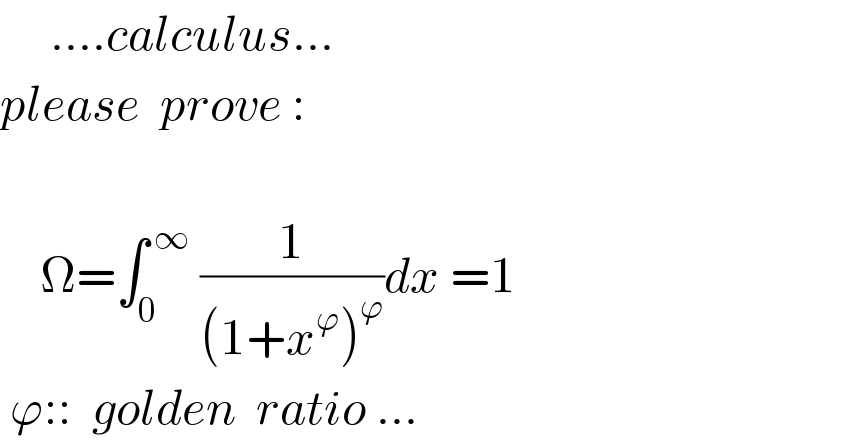
Question and Answers Forum
Question Number 112697 by mnjuly1970 last updated on 09/Sep/20

Commented by mathdave last updated on 09/Sep/20

Commented by MJS_new last updated on 09/Sep/20

Commented by mnjuly1970 last updated on 09/Sep/20

Answered by MJS_new last updated on 09/Sep/20
![trying “reverse method” (d/dx)[f(x)(1+x^ϕ )^(1−ϕ) ]= =f′(x)(1+x^ϕ )^(1−ϕ) +(ϕ−ϕ^2 )f(x)(x^(ϕ−1) /((1+x^ϕ )^ϕ ))= =((f′(x)(1+x^ϕ )+(ϕ−ϕ^2 )f(x)x^(ϕ−1) )/((1+x^ϕ )^(ϕ ) )) putting f(x)=x we get (((1+ϕ−ϕ^2 )x^ϕ +1)/((1+x^ϕ )^ϕ )) but 1+ϕ−ϕ^2 =0 ⇒ ∫(dx/((1+x^ϕ )^ϕ ))=(x/((1+x^ϕ )^(ϕ−1) ))+C=(x/((1+x^ϕ )^(1/ϕ) ))+C ∫_0 ^∞ (dx/((1+x^ϕ )^ϕ ))=lim_(x→∞) (x/((1+x^ϕ )^(1/ϕ) )) =1](Q112745.png)
Commented by mnjuly1970 last updated on 09/Sep/20

Commented by MJS_new last updated on 09/Sep/20

Answered by ajfour last updated on 09/Sep/20
![I=∫(dx/([1+x(x^(1/ϕ) )]^ϕ )) =∫(dx/(x(x^(−1/ϕ) +x)^ϕ )) let x=e^t ⇒ (dx/x)=dt I=∫_(−∞) ^( ∞) (dt/((e^(−t((1/ϕ))) +e^t )^ϕ )) but (1/ϕ)=ϕ−1 , so I=∫(dt/(((e^t /e^(ϕt) )+e^t )^ϕ )) = ∫_(−∞) ^( ∞) ((e^(−ϕt) dt)/((e^(−ϕt) +1)^ϕ )) let e^(−ϕt) +1=z ⇒ e^(−ϕt) dt = −(dz/ϕ) I=−(1/ϕ)∫_∞ ^( 1) z^(−ϕ) dz I=(1/(ϕ(ϕ−1)))[z^(−ϕ+1) ]_∞ ^1 I = (((ϕ−1)/(ϕ−1)))(1−0) = 1 ★.................................★](Q112761.png)
Commented by mnjuly1970 last updated on 09/Sep/20

Answered by mnjuly1970 last updated on 09/Sep/20
![solution. we know that:: ∫_0 ^( ∞) (x^(p−1) /((1+x)^(p+q) ))dx = ((Γ(p)Γ(q))/(Γ(p+q))) x^ϕ =t ⇒dx =(1/ϕ)t^((1/ϕ) −1) Ω =(1/ϕ) ∫_0 ^( ∞) (t^((1/ϕ) −1) /((1+t)^ϕ )) dt = (1/ϕ)[((Γ((1/ϕ))Γ(ϕ−(1/ϕ)))/(Γ(ϕ )))] we know that : ϕ^2 =ϕ+1⇒ϕ=1+(1/ϕ) ∴ Ω =(1/ϕ)(((Γ((1/ϕ)))/(Γ(ϕ))))=((Γ(1+(1/ϕ)))/(Γ(ϕ))) =((Γ(ϕ))/(Γ(ϕ))) =1 ✓ ...m.n...](Q112762.png)
Commented by Tawa11 last updated on 06/Sep/21

